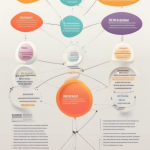The Impact of AI Content Creation Tools on Digital Marketing Strategies
The advent of AI content creation tools has significantly altered the landscape of digital marketing. As businesses strive to keep pace with rapid technological advancements, leveraging these tools can offer a substantial competitive edge. These artificial intelligence systems enhance productivity, streamline workflows, and create content that resonates with audiences. The impact of these tools is profound, influencing several facets of digital marketing strategies.
One of the most notable advantages of AI content creation tools is their ability to produce high-quality content quickly. This speed allows marketers to keep their content calendars full, enabling a consistent online presence. For example, brands can utilize AI systems to generate articles, social media posts, and even marketing copy in a fraction of the time it would take a human writer.
Additionally, AI tools can analyze user engagement data and SEO trends to optimize content. By considering factors like keyword density and search volume, these tools help marketers craft content that not only engages readers but also ranks well on search engines. As a result, businesses can attract more organic traffic, ultimately enhancing their brand visibility and authority.
Furthermore, AI content creation tools often incorporate natural language processing (NLP), allowing them to produce content that mimics human writing styles. This capability is crucial in creating personalized experiences for users. Customers today crave authentic interactions, and AI-generated content can adapt to various tones and styles based on user profiles, preferences, and behaviors.
- Consistency: AI tools ensure that the brand voice remains consistent across all platforms, maintaining trust and reliability with consumers.
- Cost-Effectiveness: By automating content creation, businesses can allocate their budgets more efficiently, focusing resources on other critical areas of marketing.
- Data-Driven Insights: AI tools provide analytics regarding content performance, helping marketers refine their strategies in real-time.
While the benefits of AI content creation tools are many, some marketers express concerns about relying too heavily on technology. They argue that over-automation can strip content of its human touch, making it feel impersonal. However, when used strategically, AI can complement human creativity rather than replace it. Collaborative efforts between AI tools and skilled writers can yield superior results, harnessing both efficiency and authenticity.
Moreover, these tools can assist in content ideation. Many AI platforms analyze trending topics and suggest new content ideas based on current consumer interests. This ensures that marketing teams remain proactive rather than reactive, aligning their content strategies with market demands.
AI content creation tools also play a pivotal role in audience segmentation and targeting. By analyzing vast amounts of data, these tools can identify specific audience segments and tailor content to meet their unique needs. The result is a more focused marketing approach that can lead to higher conversion rates.
AI-driven tools into content marketing strategies does come with a learning curve. Marketers need to familiarize themselves with the technology to maximize its potential. With various options available, choosing the right tool for your business should take into account your specific needs, team size, and budget. Here are some factors to consider when selecting an AI content creation tool:
- User Interface: Look for tools that offer easy navigation and a user-friendly experience.
- Integration Capabilities: Ensure the tool can integrate seamlessly with existing marketing software.
- Customization Options: Choose a platform that allows you to tailor the content to fit your brand voice and identity.
As digital marketing evolves, so too will the role of AI content creation tools. Keeping an eye on new developments in AI technology can further enhance strategies and maintain a competitive advantage. As we move forward, the synergy between human creativity and AI efficiency will undoubtedly shape the future of content marketing.
Ultimately, embracing AI content creation tools can streamline processes, enrich content quality, and meet the growing demands of consumers in today’s digital landscape. By leveraging these innovations effectively, brands can not only enhance their marketing strategies but also create lasting relationships with their audiences.
Best Practices for Integrating AI Tools into Your Content Workflow
As the digital landscape evolves, integrating AI tools into your content workflow becomes increasingly vital. These tools not only enhance productivity but also empower writers to deliver high-quality content with precision. Here are some best practices to effectively incorporate AI tools into your content creation process.
Understand Your Needs
Before diving into the vast array of AI content creation tools available, it’s essential to identify your specific needs. Consider the following:
- Type of Content: Are you focusing on blog posts, social media updates, or long-form articles?
- Volume of Work: Do you need assistance with generating ideas, editing, or both?
- Budget: Determine how much you’re willing to invest in these tools.
Choose the Right Tools
Once you clarify your requirements, you can select the tools that best fit your workflow. Some of the most popular options include:
- Content Generation: Tools like Jasper and Writesonic help with generating engaging text quickly.
- SEO Optimization: Platforms such as Surfer SEO provide keyword suggestions and optimize your content for search engines.
- Editing and Proofreading: Grammarly and ProWritingAid assist in refining your writing and ensuring grammatical correctness.
Streamline Your Workflow
Integrating AI tools can streamline your content creation process significantly. Here are some tips:
- Drafting: Use AI to create initial drafts based on your outlined ideas. This saves time and sparks creativity.
- Research: Leverage AI-driven research tools to gather relevant data, ensuring your content is factual and up-to-date.
- Editing: Once you’ve drafted your content, utilize AI editing tools to polish your writing and eliminate errors.
Incorporate Feedback Loops
Integrating AI tools doesn’t mean you should overlook the human element. Establish a feedback loop where content is reviewed by colleagues or readers. This helps refine your output and ensures that it resonates with your audience. Consider conducting A/B testing by publishing different versions of content to see which performs better.
Stay Informed About AI Trends
The field of AI content creation is evolving rapidly. Keeping yourself informed about the latest tools and features can provide a competitive edge. Subscribe to industry newsletters, participate in webinars, and engage with content creation communities. This continuous learning will enhance your ability to leverage AI effectively.
Monitor Performance Metrics
Using analytics tools to track the performance of your content is crucial. Focus on metrics like:
- Engagement Rates: How readers interact with your content is a good indicator of its quality.
- SEO Ranking: Monitor how well your articles perform in search engines after using AI tools.
- Conversion Rates: Ultimately, see if your content encourages the desired actions from your audience.
Maintain a Personal Touch
While AI tools can enhance your writing, it’s important not to lose your unique voice. Ensure your personality shines through by adding personal anecdotes and insights. Balance the efficiency of AI with the authenticity that comes from human experience.
Evaluate and Adapt
Periodically review your integration of AI tools within your content workflow. Assess what’s working and what isn’t. Be willing to switch tools, discard underperforming practices, and continually evolve your strategies. The flexibility to adapt will not only improve your content quality but also keep you ahead of the curve in your niche.
Adopting these best practices for integrating AI content creation tools can lead to a more efficient, engaging, and productive content workflow. By understanding your needs, choosing the right tools, streamlining processes, and maintaining a human touch, you can elevate your content strategy in this AI-driven digital landscape.
Conclusion
The landscape of digital marketing has undergone a seismic shift with the advent of AI content creation tools. These tools are not merely an add-on to existing strategies; they serve as a transformative force that enhances efficiency, creativity, and engagement. As brands and marketers harness the power of AI, understanding the impact these technologies have on digital strategies becomes crucial.
AI content creation tools allow businesses to generate high-quality content at unprecedented speeds. This capability is particularly beneficial in today’s fast-paced digital environment, where attention spans are short and competition is fierce. Brands can now produce tailored content that resonates with specific audience segments, ensuring that marketing campaigns are not just seen but also felt. The ability to analyze consumer behavior and preferences allows AI tools to guide marketers in crafting messages that are timely and relevant, significantly enhancing customer engagement.
Additionally, the capability of these tools to analyze vast amounts of data provides invaluable insights. Marketers can determine what works and what doesn’t, enabling continuous refinement of their strategies. This data-driven approach mitigates the risks associated with traditional content creation, where success is often based on intuition rather than empirical evidence. With AI, marketers can iterate and improve their content quickly, increasing the effectiveness of campaigns while decreasing the time to market.
To fully harness the power of AI content creation tools, it’s essential to follow best practices for their integration into your content workflow. First and foremost, establishing clear objectives is vital. Marketers need to define what they hope to achieve by utilizing AI tools. This could range from speeding up content production to enhancing SEO performance or even generating new content ideas. By setting specific, measurable goals, teams can better gauge the effectiveness of the tools they employ.
Training and familiarization with the AI tools are crucial steps in the integration process. Team members should not only know how to use these tools but also understand the underlying principles that drive their effectiveness. Many AI tools come equipped with tutorials, webinars, and community forums, which can significantly aid in this learning process. Investing time in these resources ensures that the team maximizes the potential of the technology at their disposal.
Another best practice involves maintaining a balance between automation and human touch. While AI can generate impressive content, the unique nuances of human expression and creativity are irreplaceable. Businesses should consider AI as a powerful assistant rather than a complete replacement for human writers. Brainstorming creative ideas, crafting compelling narratives, and injecting emotion into content needs the human touch. AI can handle repetitiveness and data-driven tasks, freeing up writers to focus on higher-order functions that require creativity and storytelling prowess.
Collaboration and feedback loops are also pivotal in enhancing the effectiveness of AI in content strategies. Marketers ought to mix the analytical insights from AI with creative processes. For instance, an AI tool may suggest topics or headlines based on trending searches, but it’s the marketer’s job to frame them into engaging content. Regularly seeking feedback from team members ensures that everyone remains aligned and can share insights on how AI-generated content meets the brand’s voice and messaging.
Furthermore, tracking performance metrics post-implementation is essential to evaluate the success of AI tools in your content strategy. Analyzing how AI-driven content performs compared to traditional content can highlight areas for improvement and further optimization. Key performance indicators might include engagement rates, conversion rates, and overall traffic metrics. This data can guide future content strategies, ensuring that the organization continues to leverage AI effectively.
As marketers navigate the ever-evolving digital landscape, embracing AI content creation tools is not just a trend, but a necessity. By understanding their impact and integrating them thoughtfully into content workflows, businesses can stay ahead of the game. In the end, it’s about creating a seamless partnership between human creativity and AI efficiency. As the boundaries of digital marketing expand, fostering this collaboration will be paramount in crafting compelling, effective content that resonates with audiences and drives results.


